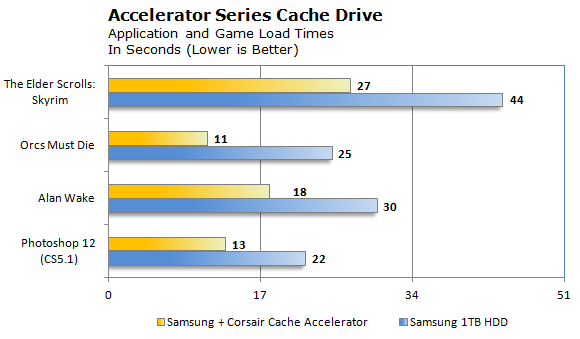HD Overdrive: Corsair's Accelerator SSD Cache
Application Load Tests, PCMark 7
Next up is a straight performance comparison between various applications and games. Performance was measured with both the hard drive alone and the Accelerator drive installed. One of the potential downsides of an SSD cache drive is that data can be evicted, leaving you dependent on just the hard drive again if you run a program you haven't used in awhile.

The gains are nearly 50% across the board. The performance gain is even greater than it looks -- most of these titles have launch screens that play short videos as part of the game's startup procedure. Since these videos play for a set amount of time regardless, the benefits of the SSD are showing directly where they matter most, specifically loading the game and getting into play.

Next, is PCMark 7. We ran the application's storage benchmark, which gives an overall figure, but also broke down some of the specific results in order to examine where the benefits are (or aren't). In this case, we've got comparative numbers for an OCZ Vertex 3 256GB running the same workload.

Performance in the specific workloads shows exactly the sort of gains we'd hoped it would. While the Vertex 3 remains the fastest solution overall, the hard drive + Corsair Accelerator are far more competitive than the hard drive alone. Having now spent about a week with the drive installed, I can say that there's no performance downside here. In a worst-case scenario, you're left with the same performance that you had before.

The gains are nearly 50% across the board. The performance gain is even greater than it looks -- most of these titles have launch screens that play short videos as part of the game's startup procedure. Since these videos play for a set amount of time regardless, the benefits of the SSD are showing directly where they matter most, specifically loading the game and getting into play.

Next, is PCMark 7. We ran the application's storage benchmark, which gives an overall figure, but also broke down some of the specific results in order to examine where the benefits are (or aren't). In this case, we've got comparative numbers for an OCZ Vertex 3 256GB running the same workload.

Performance in the specific workloads shows exactly the sort of gains we'd hoped it would. While the Vertex 3 remains the fastest solution overall, the hard drive + Corsair Accelerator are far more competitive than the hard drive alone. Having now spent about a week with the drive installed, I can say that there's no performance downside here. In a worst-case scenario, you're left with the same performance that you had before.






